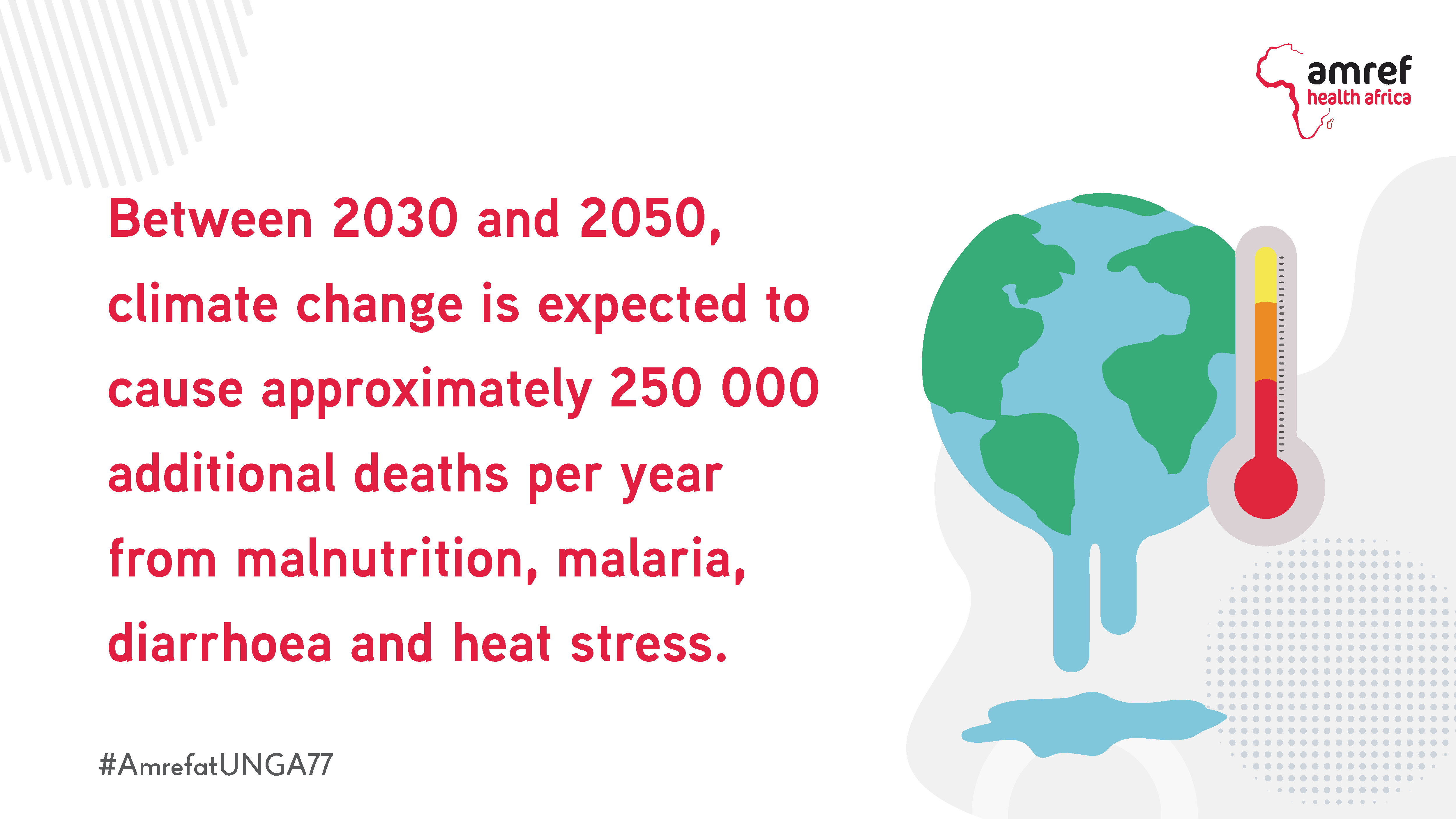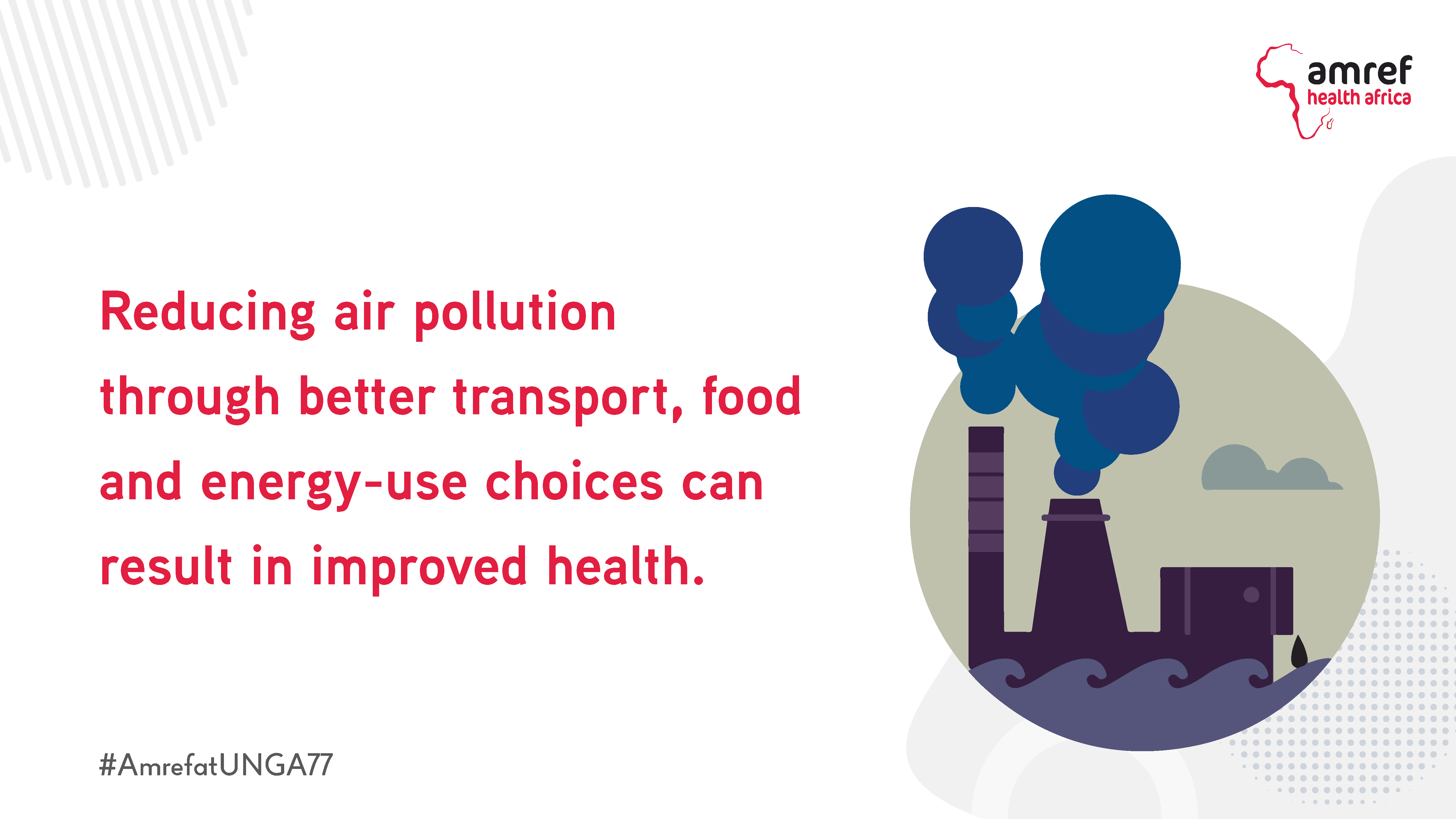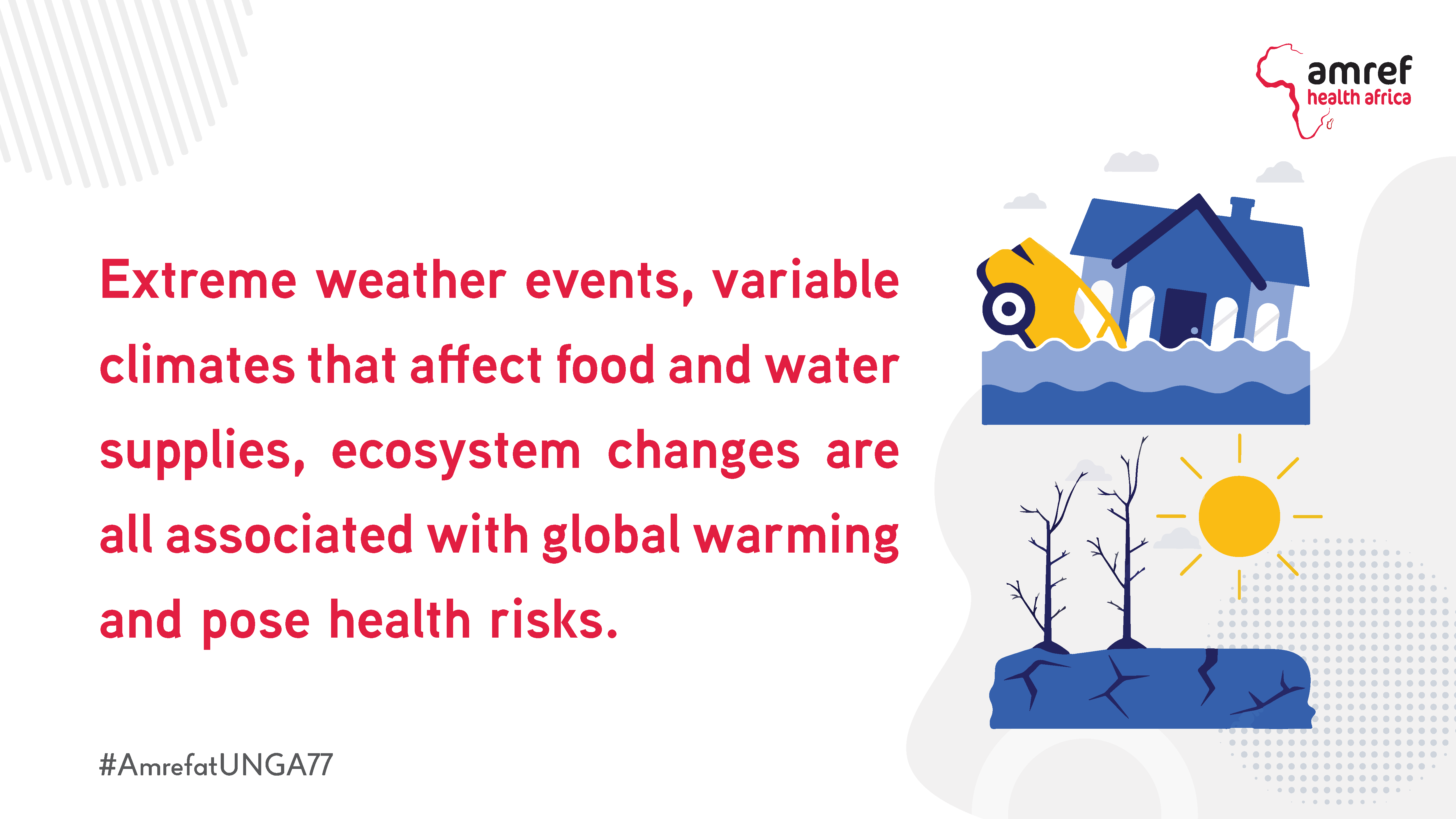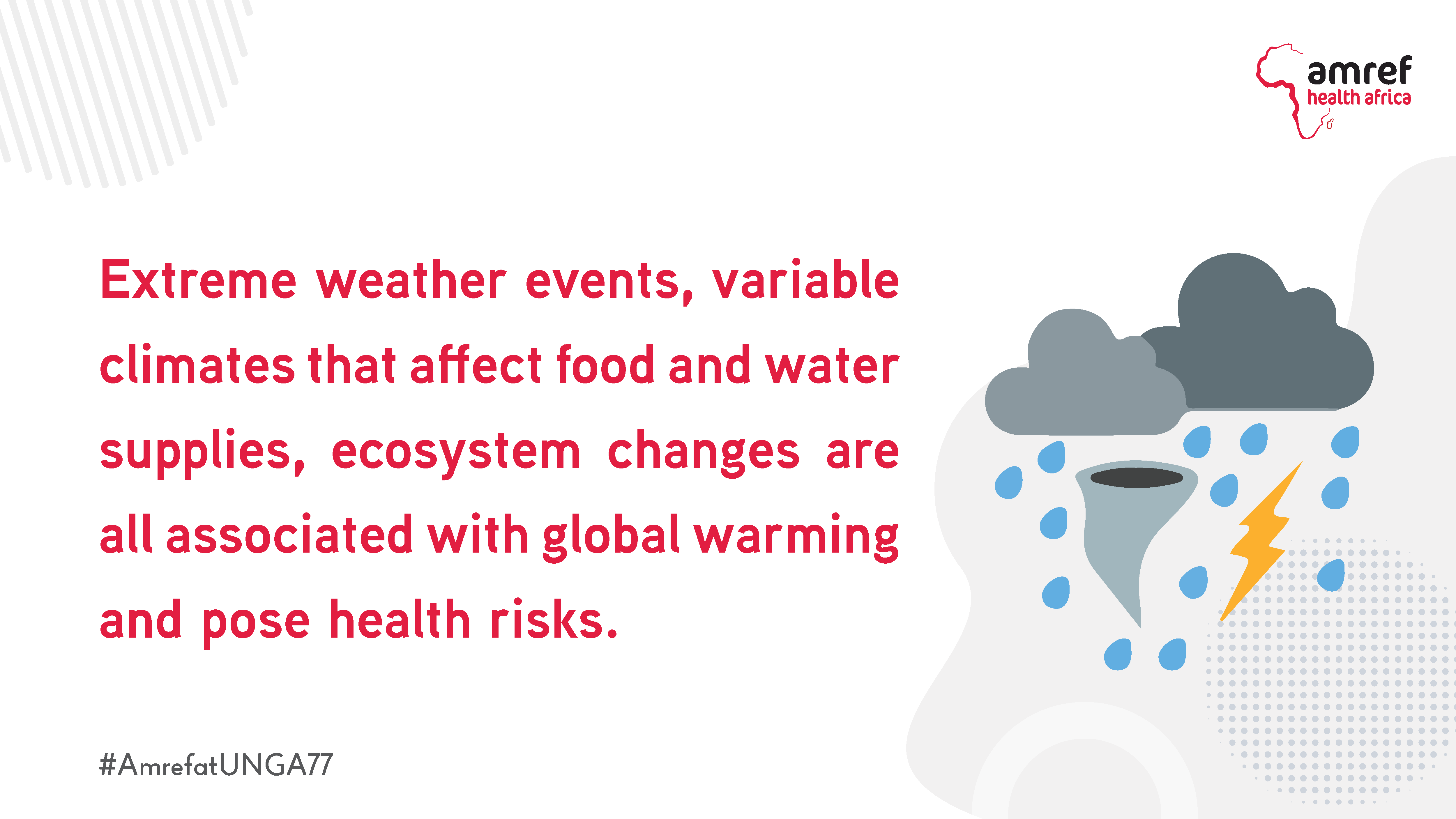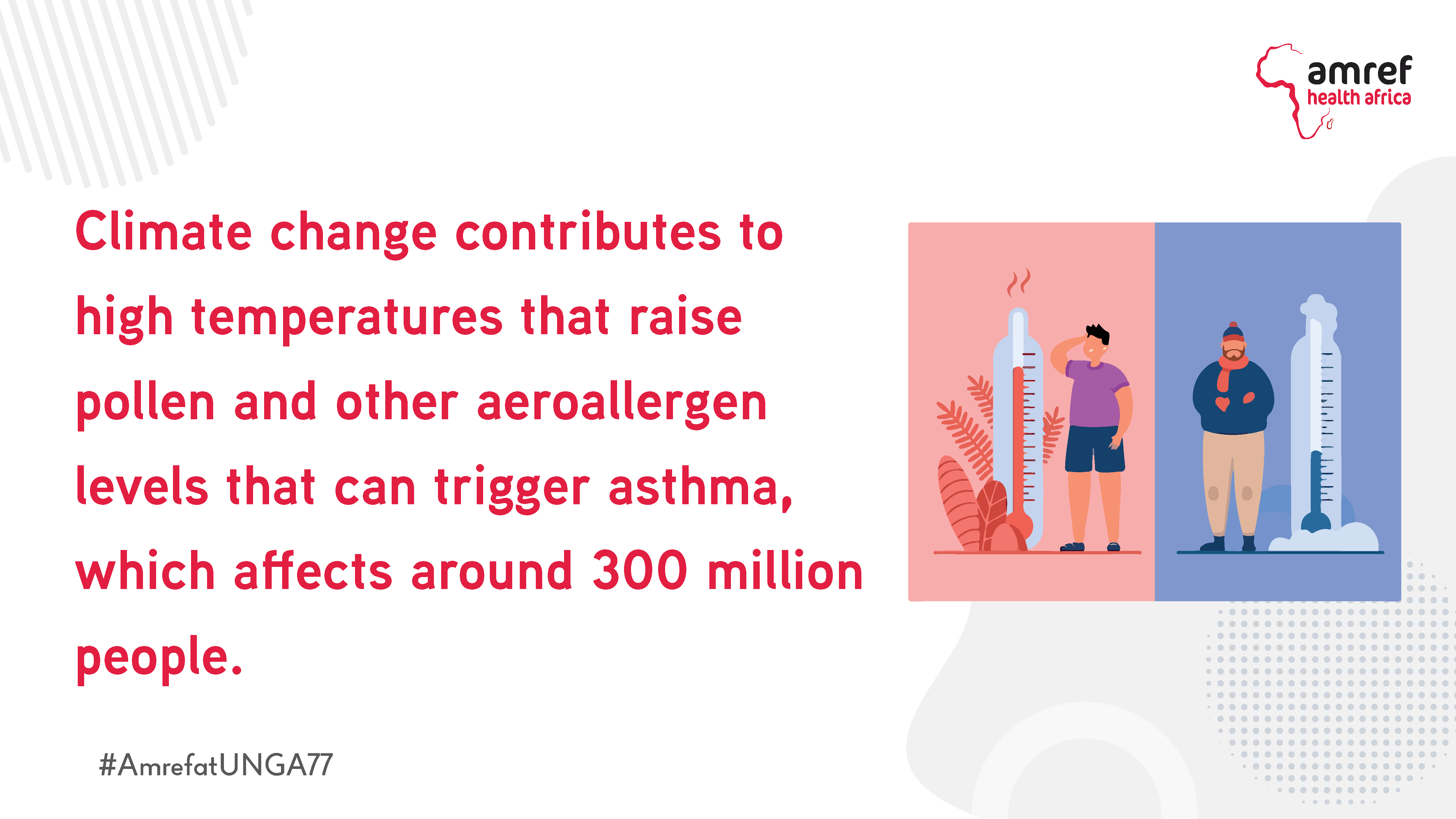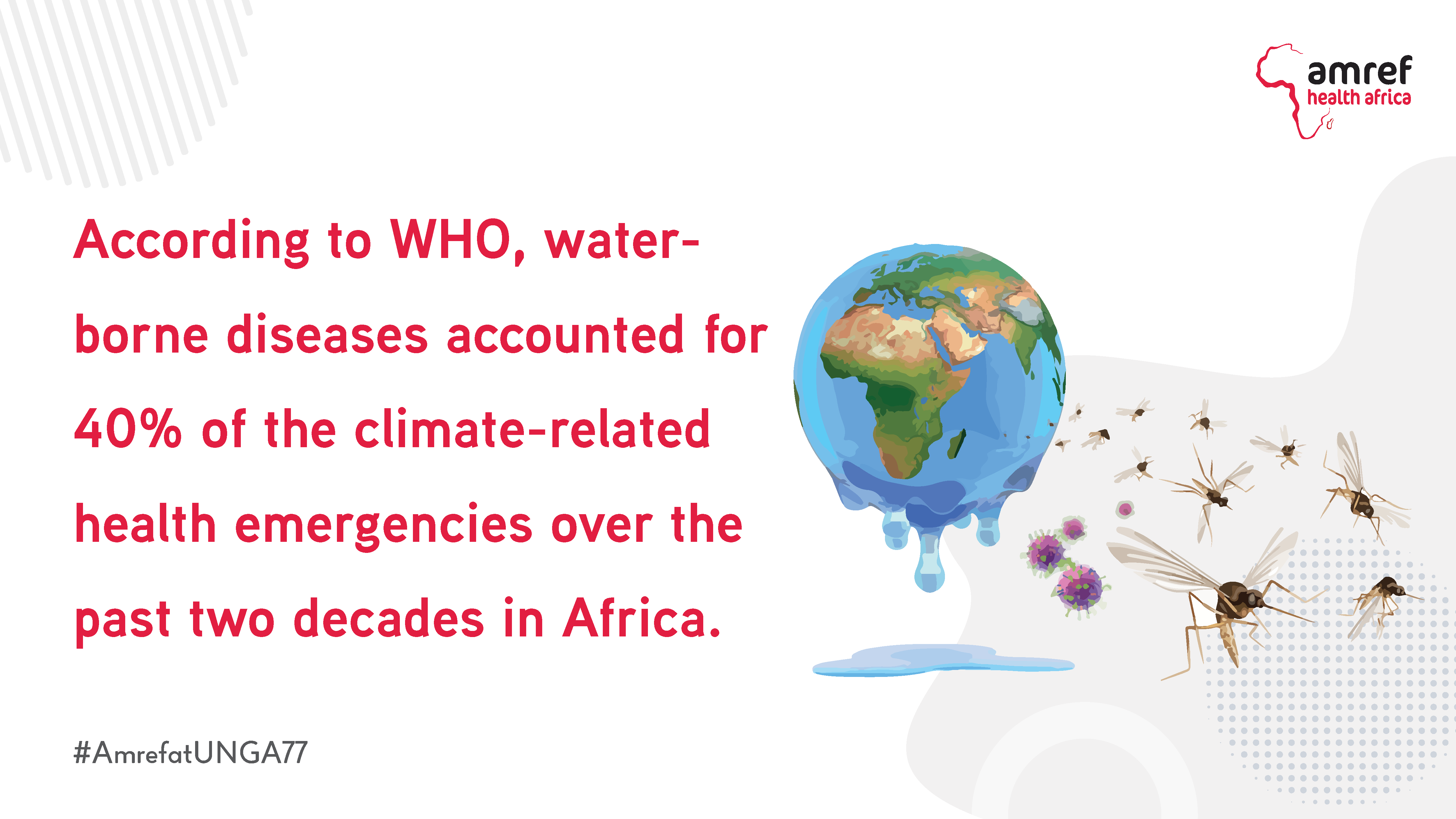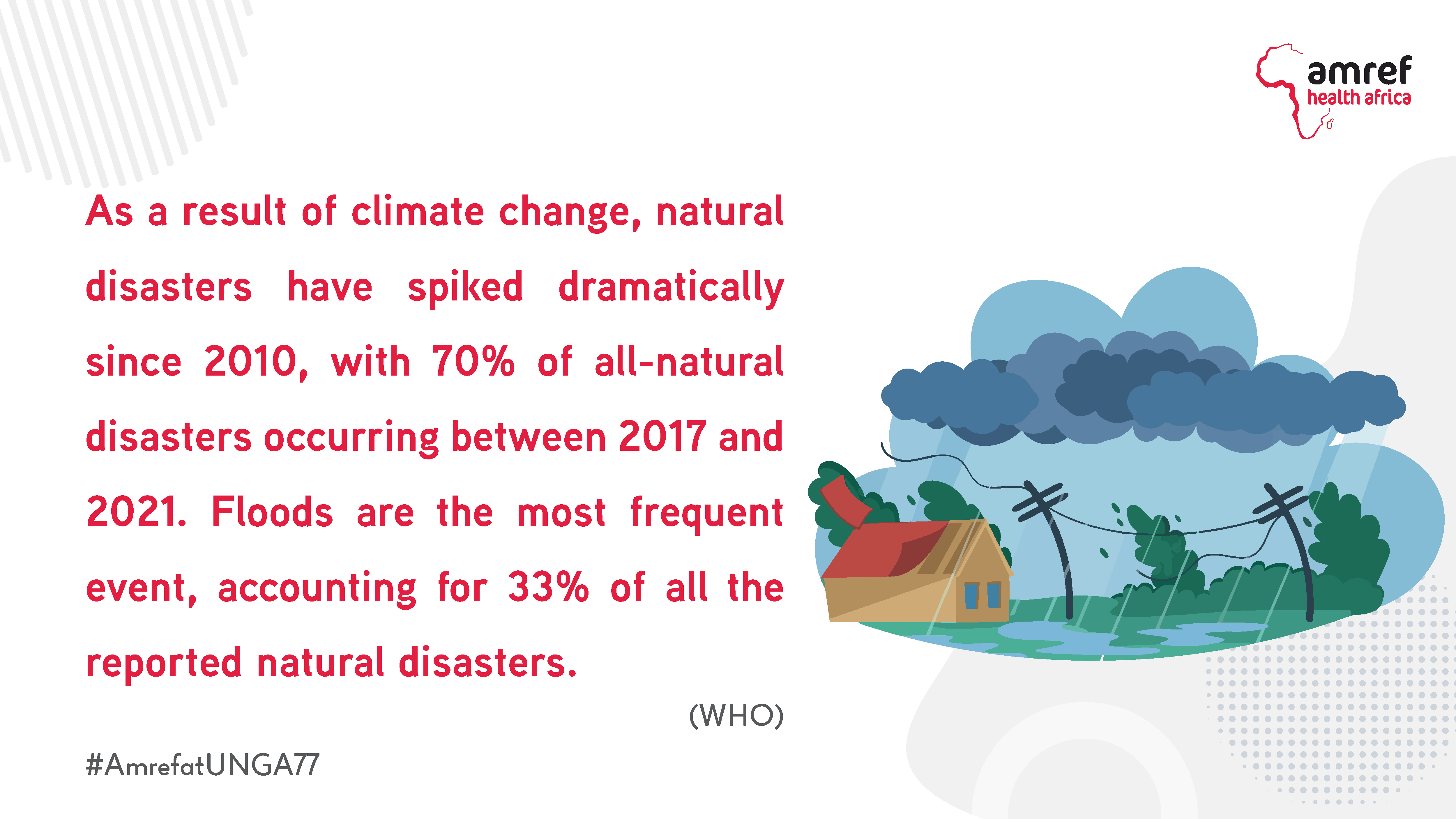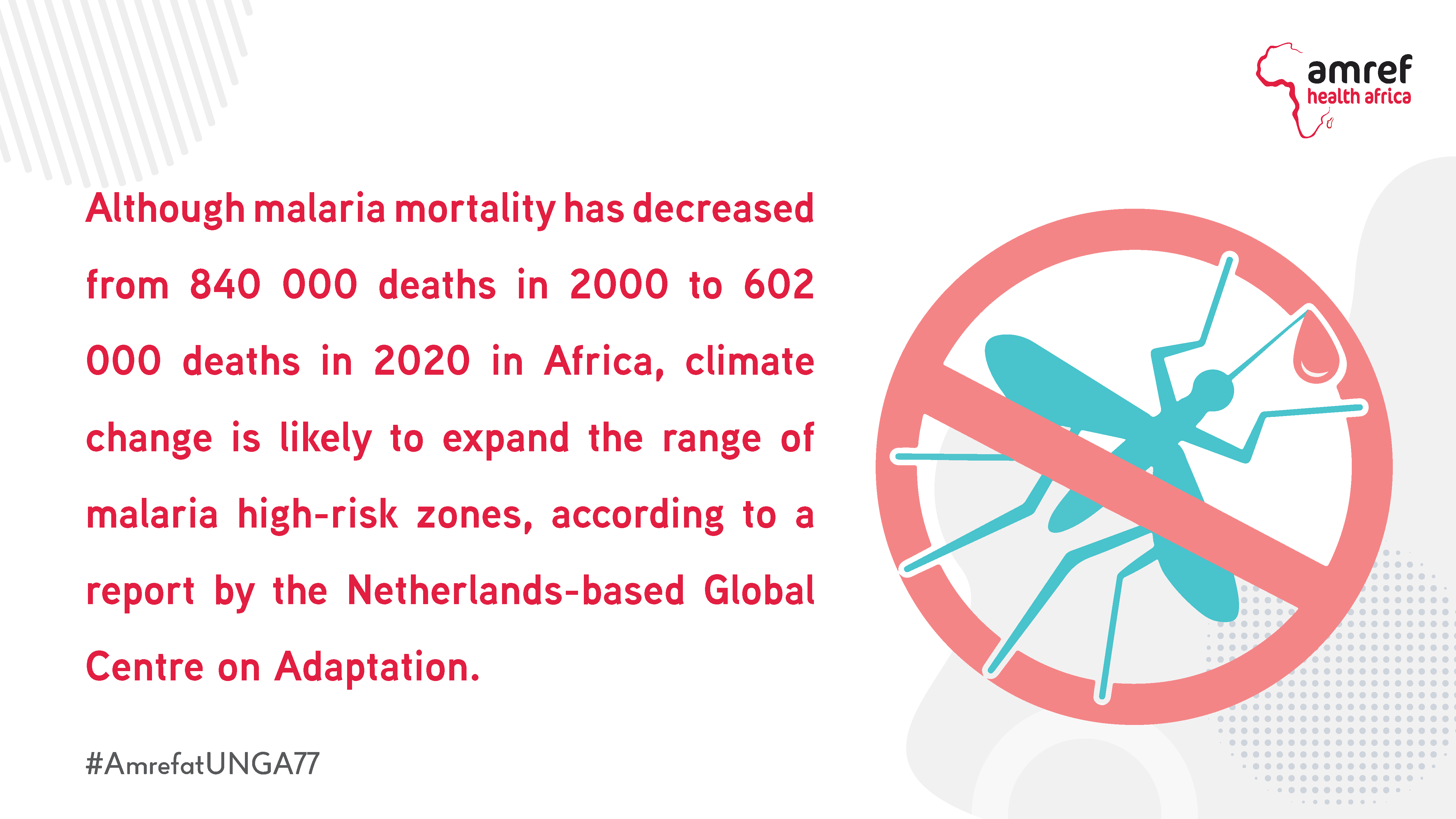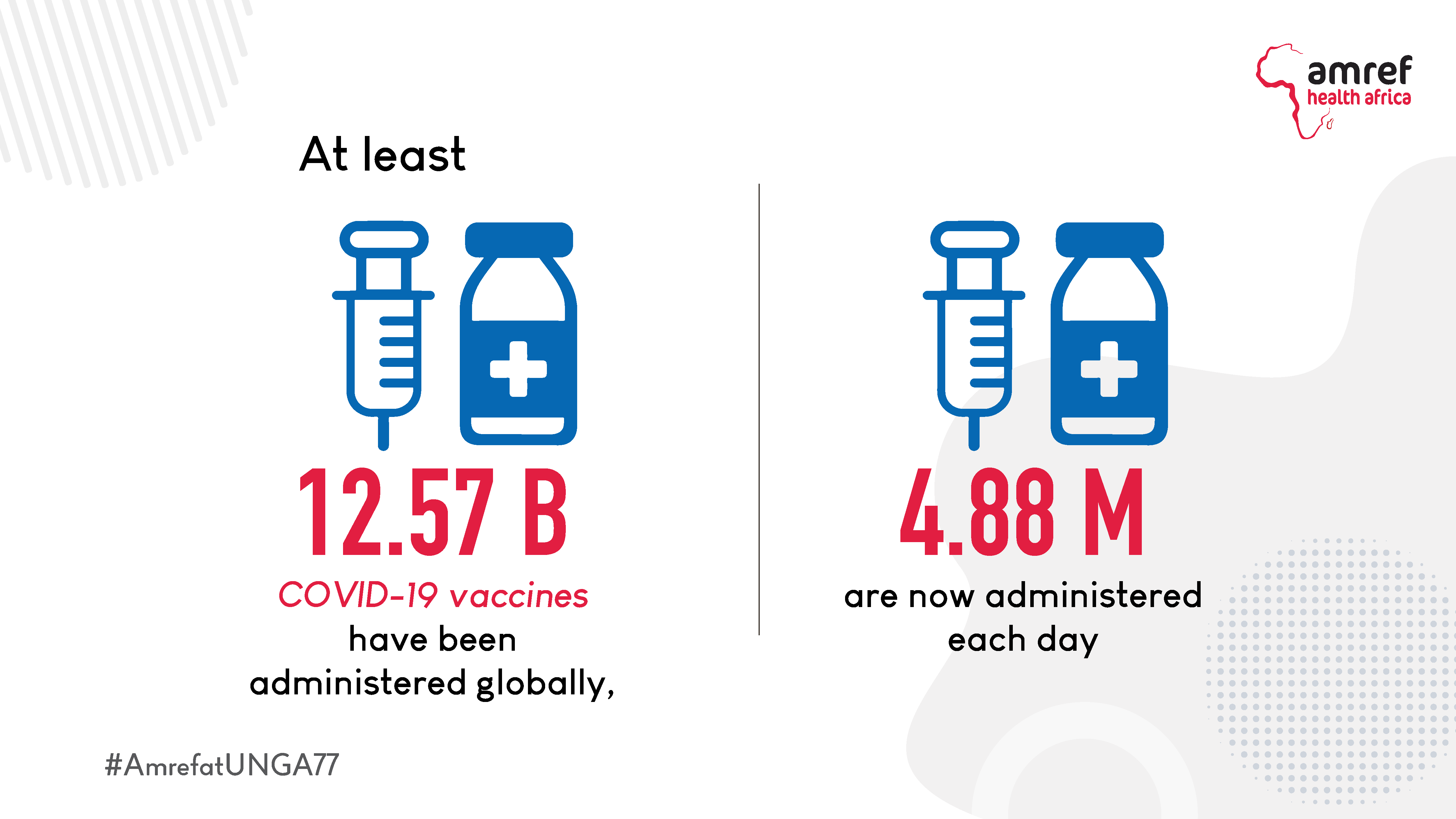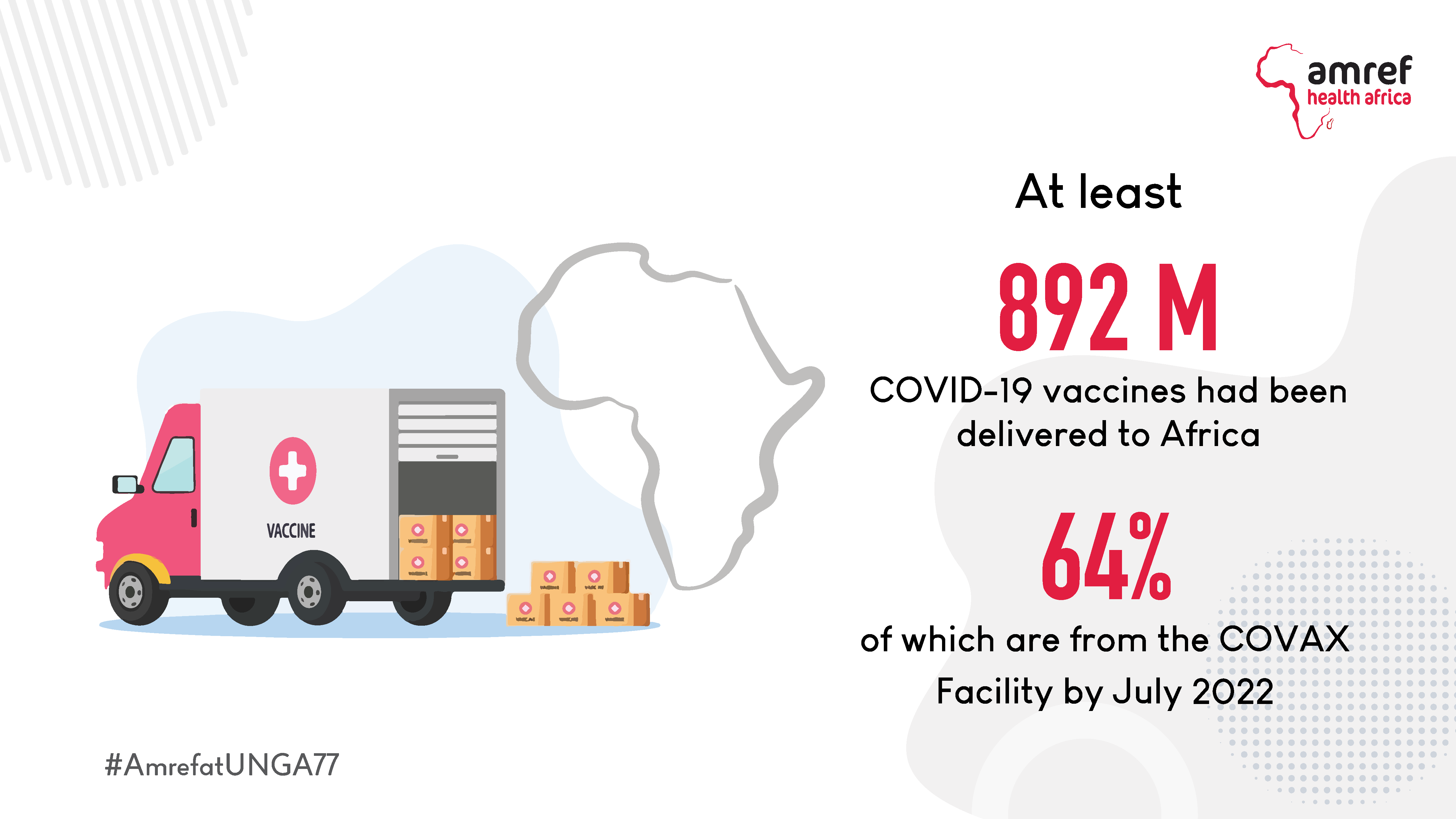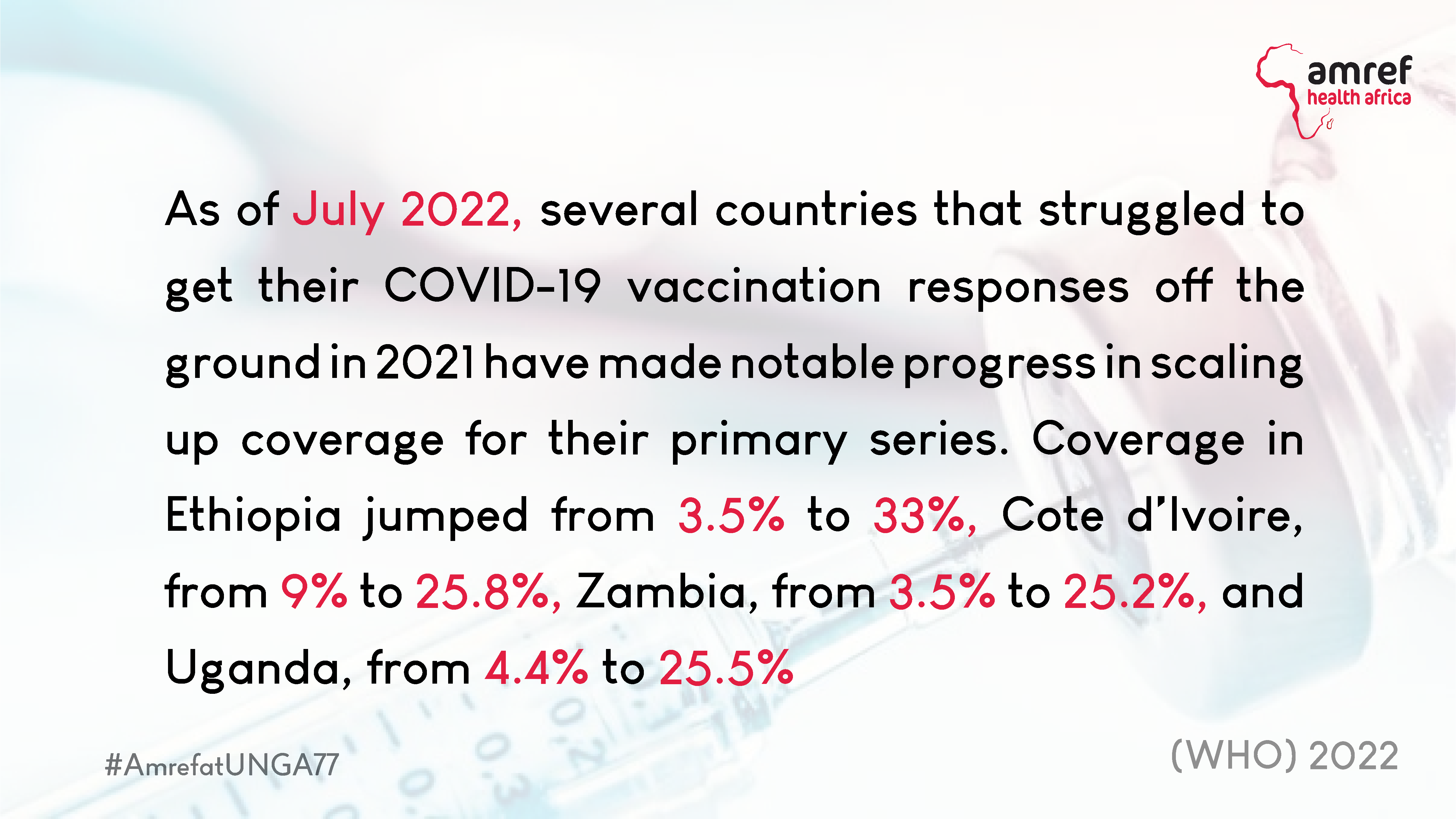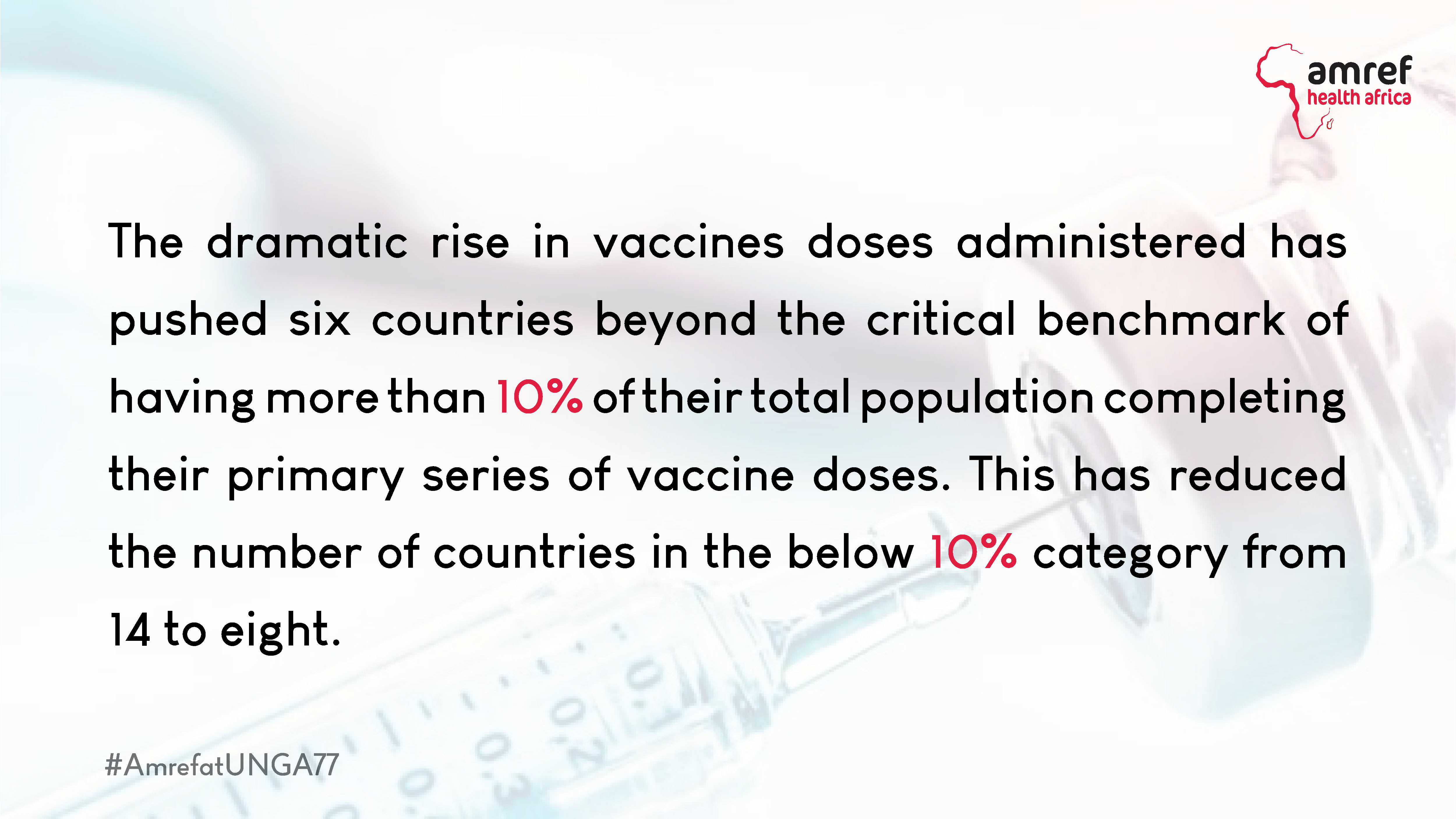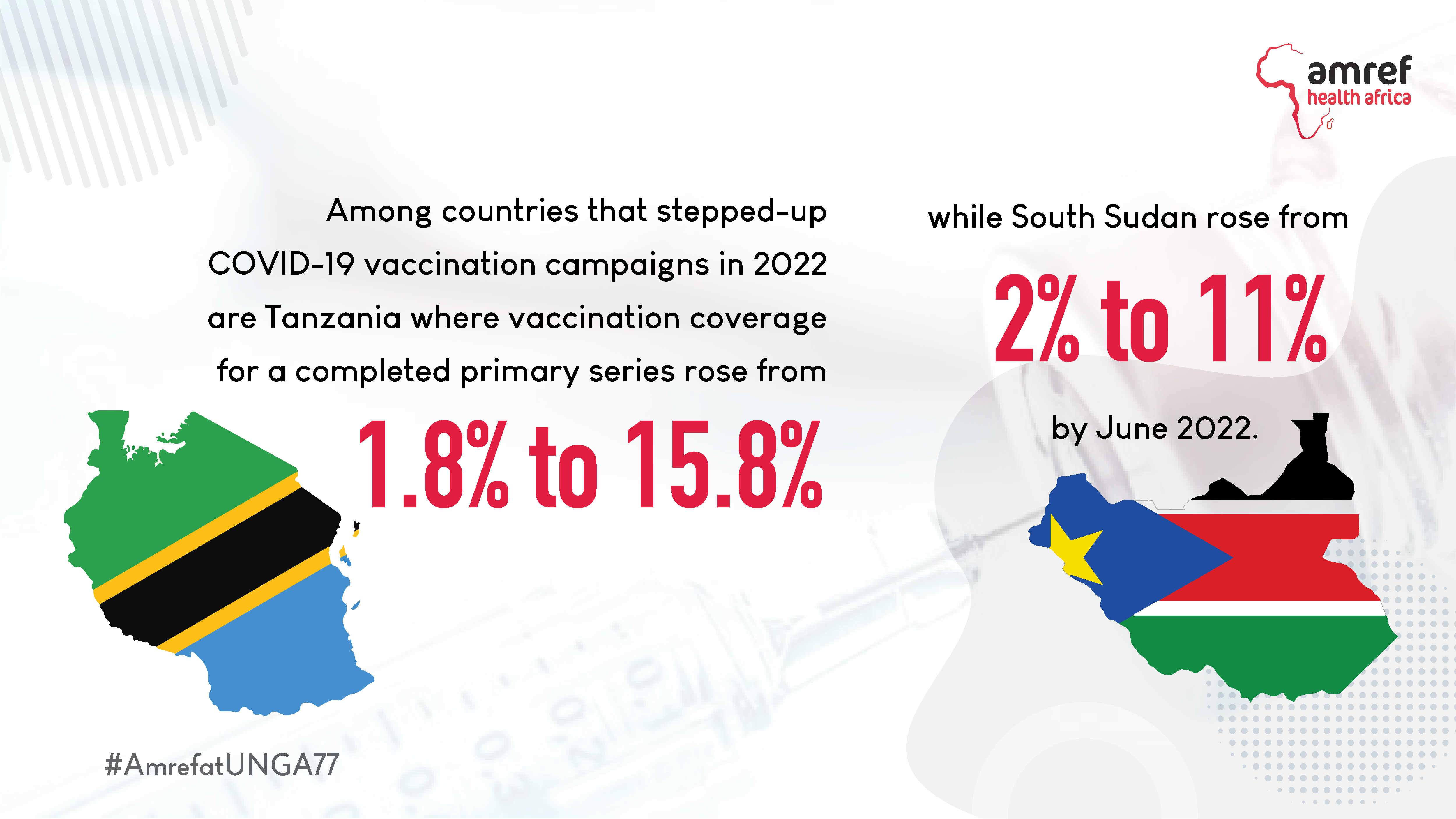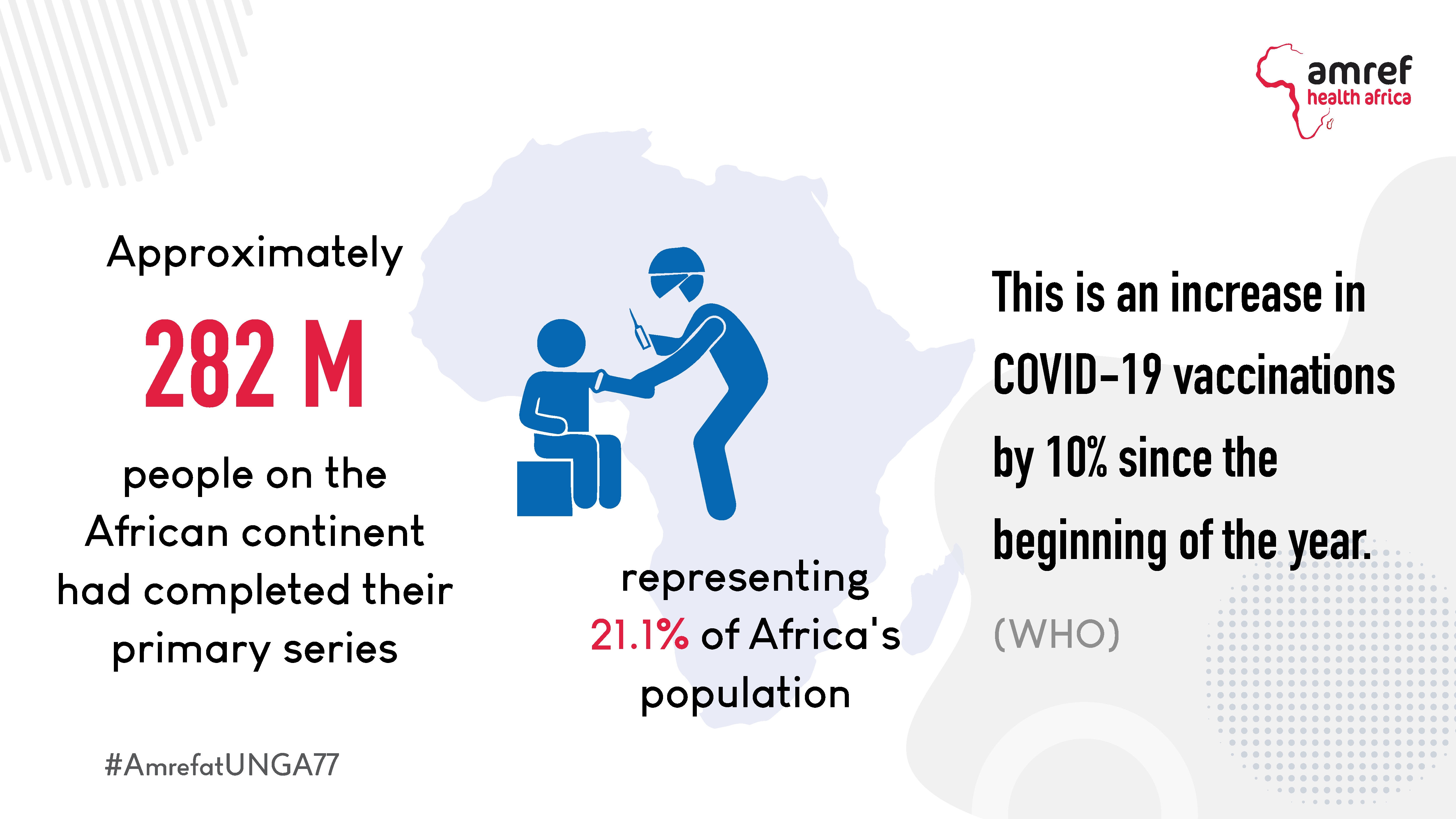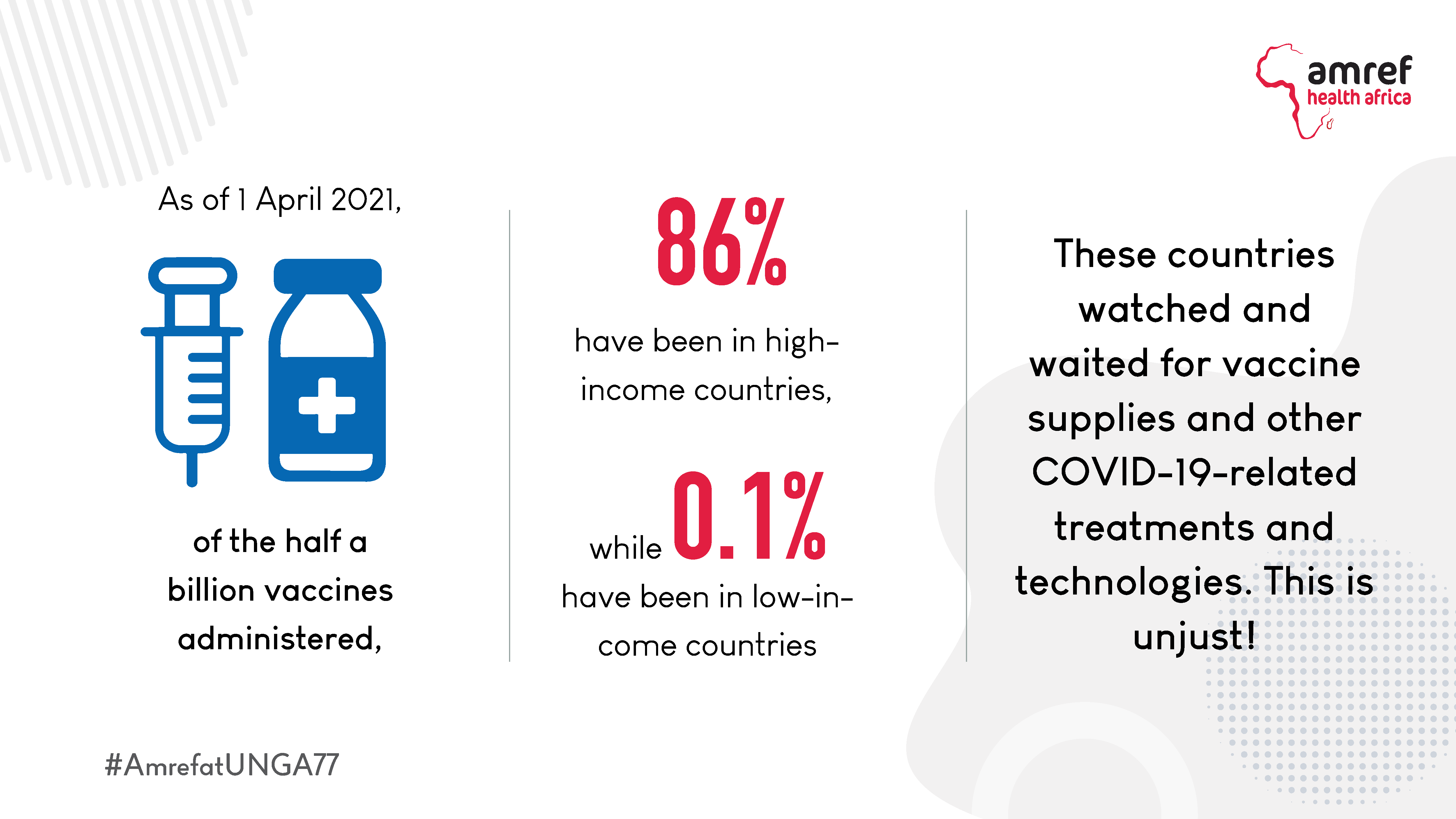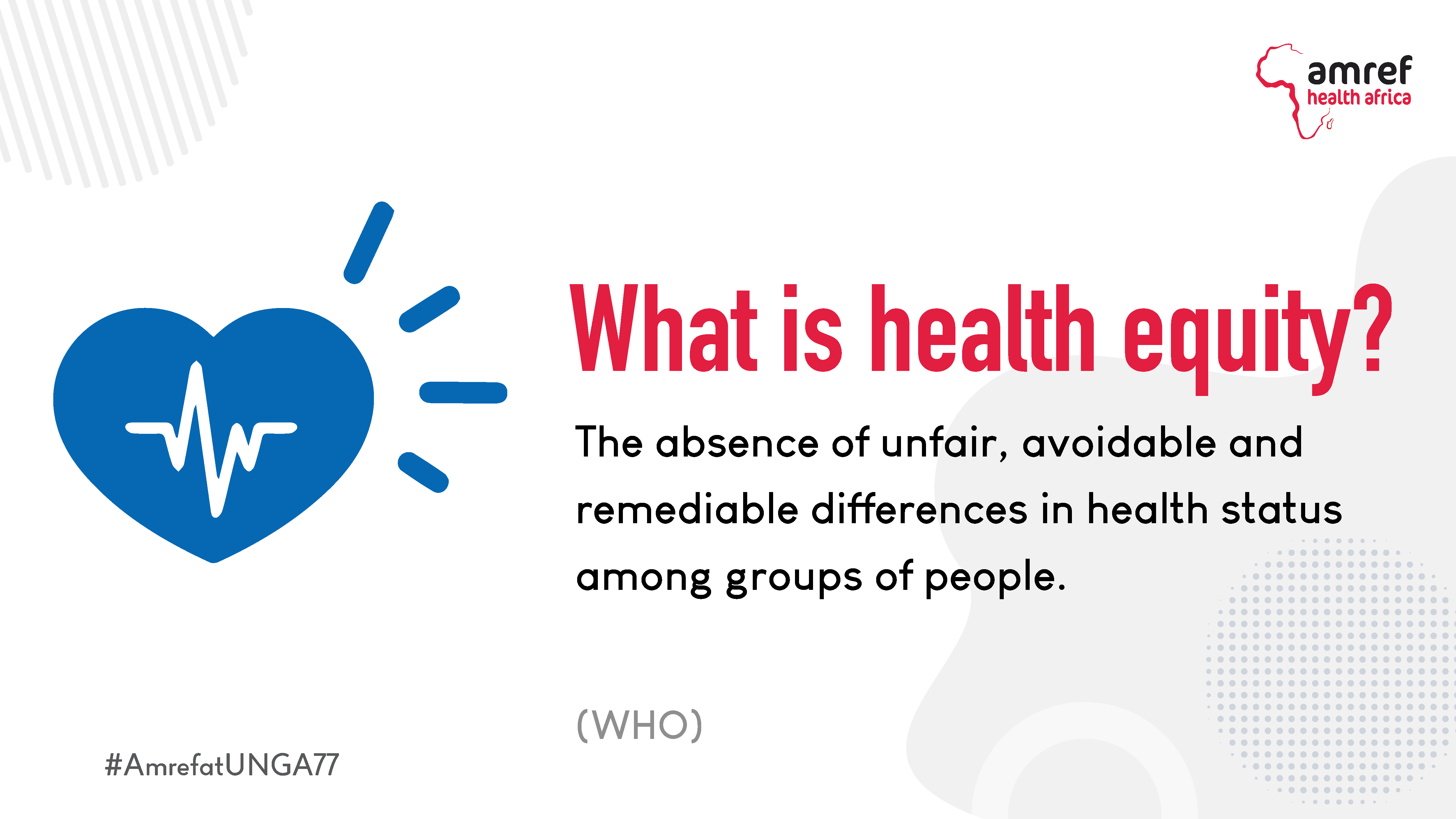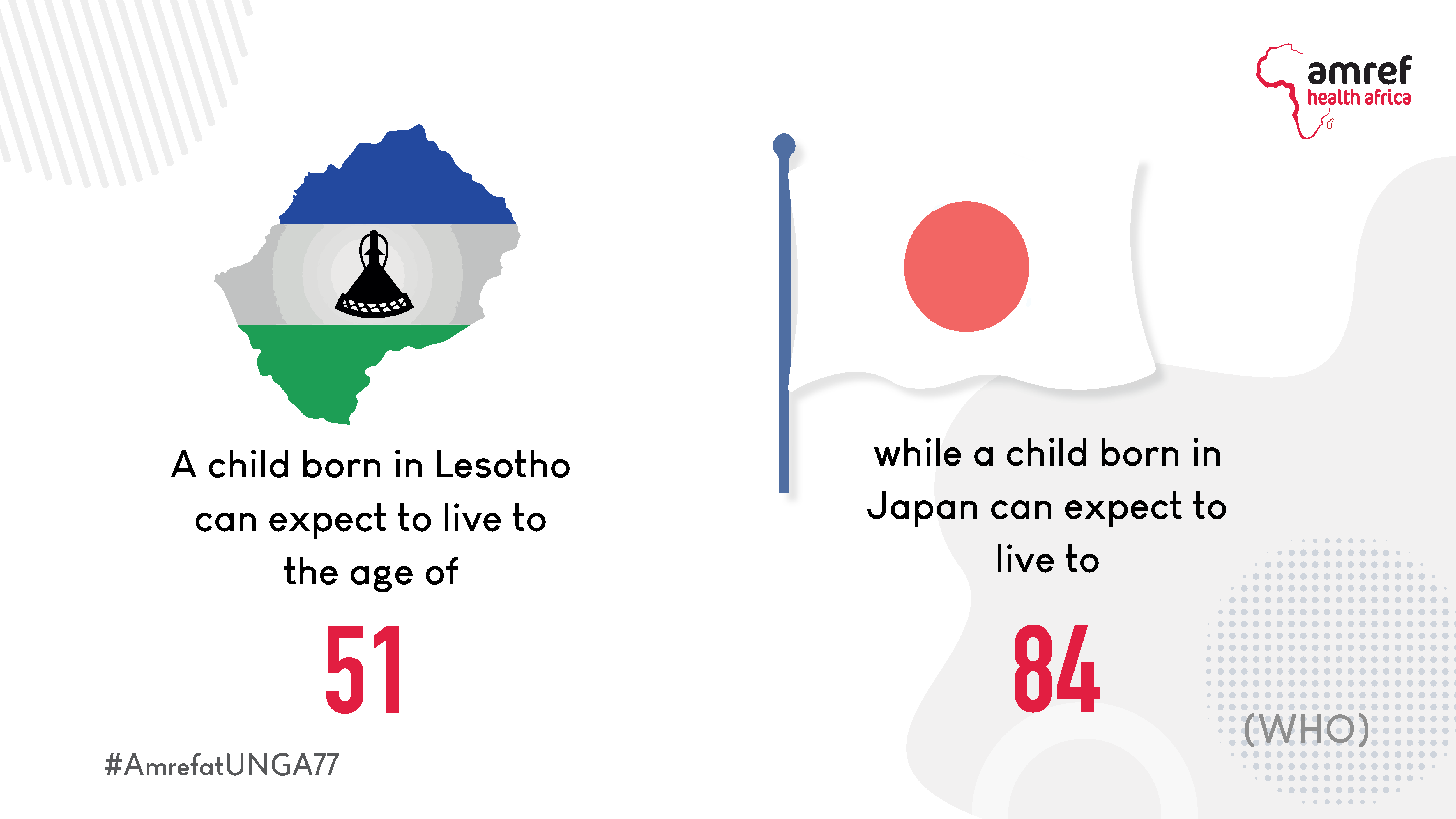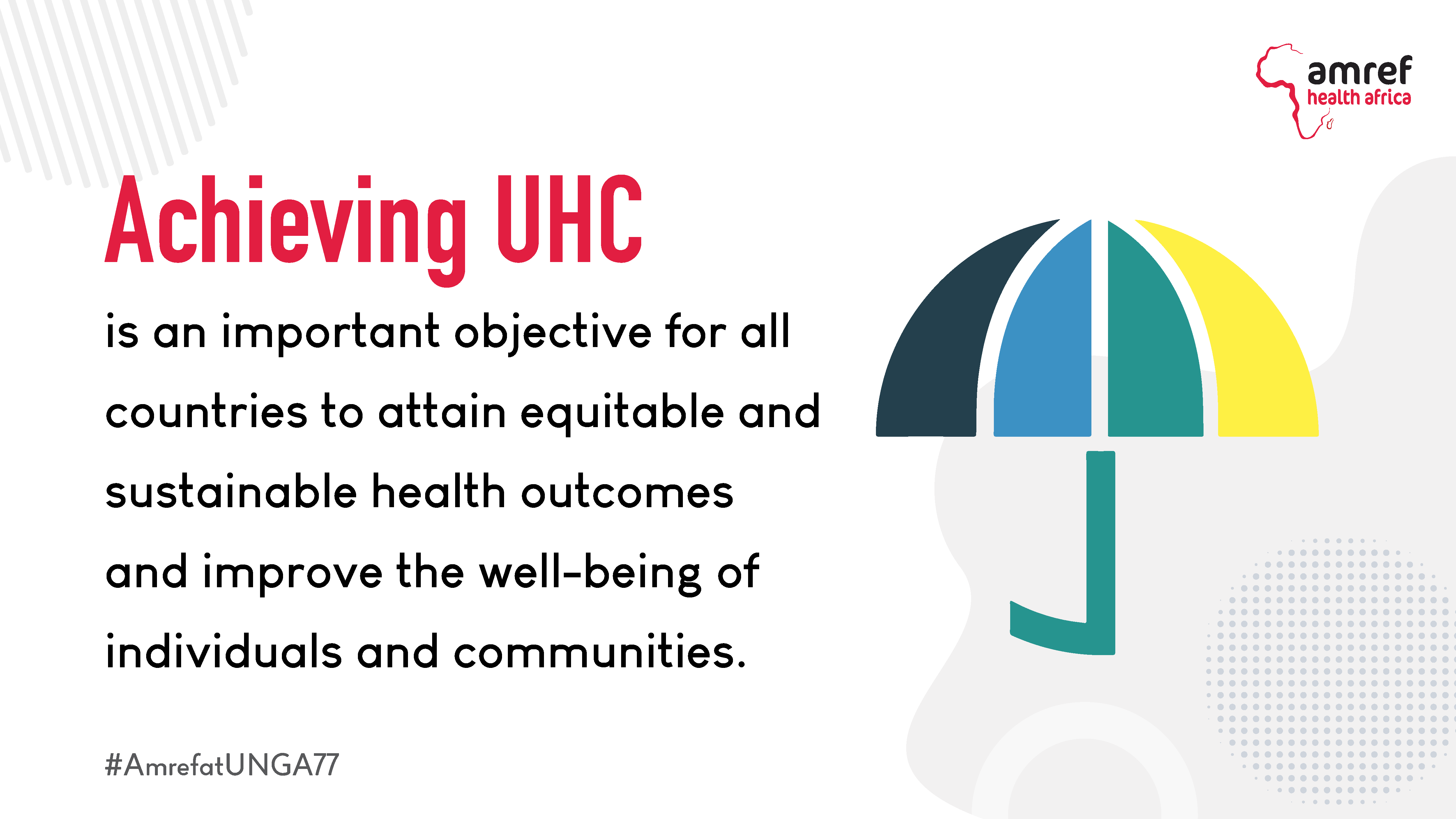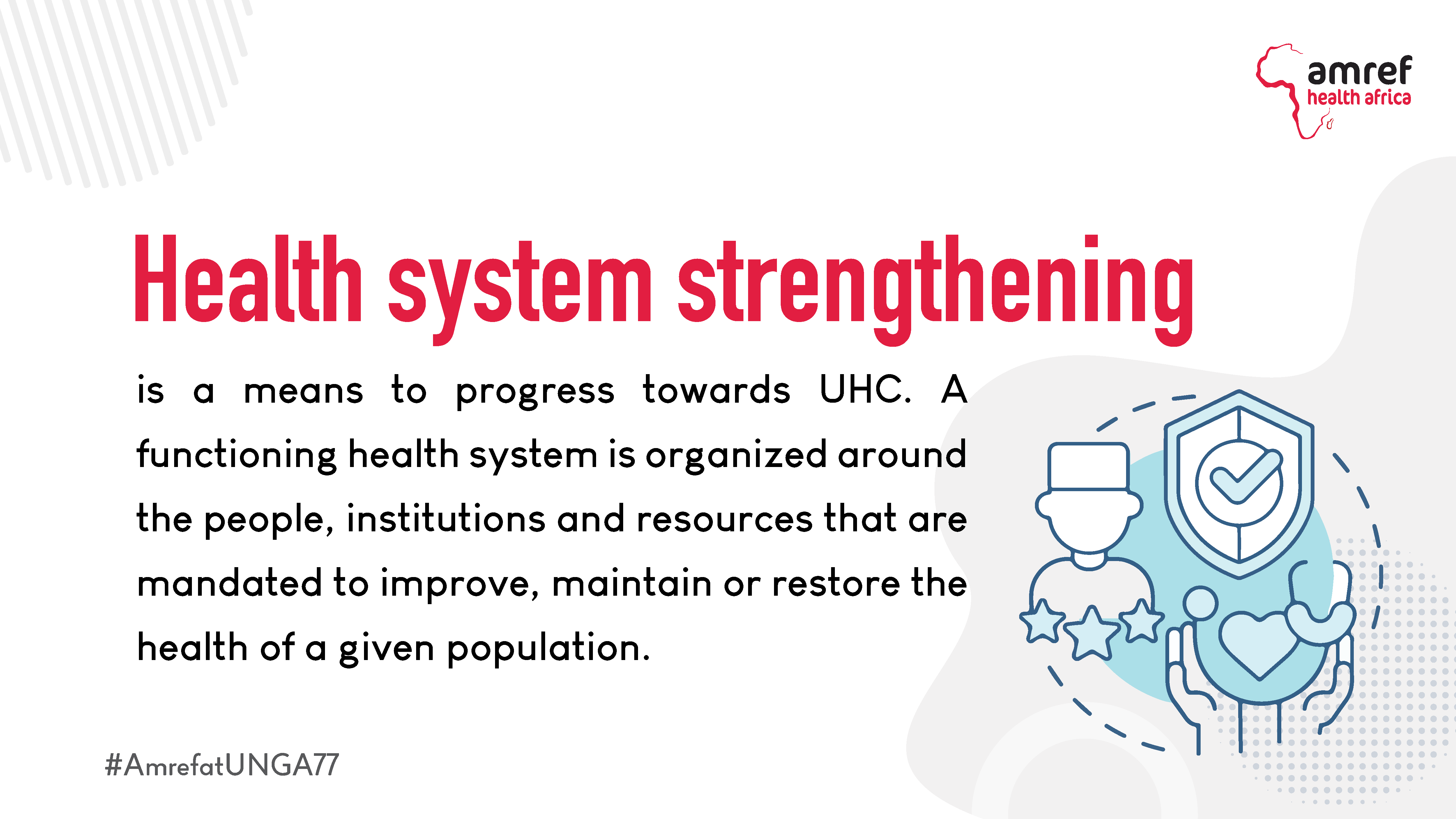Amref Health Africa at UNGA77
1st - 7th August, 2022
Theme: Step up for Breastfeeding – Educate and Support
Between 12-27 September 2022, Heads of State and Government, civil society, development organizations, youth and philanthropists will descend on New York for the 77th United Nations General Assembly (UNGA 77), where they will discuss key political, development and health issues influencing our current reality and shaping the future.
At the event, Amref Health Africa, together with our partners, is set to host various events at the sidelines of UNGA 77. These have been designed to call attention to some of the world’s most pressing health and development challenges, including preventing the next pandemic, climate resilience and justice, robust health systems and universal health coverage, all of which are expected to take centre stage at the Assembly.
To amplify the key themes of the events, we have prepared the messages below to be shared widely before, during and after the UNGA 77 sessions.
Share facts about #AmrefatUNGA77
These communication tools are available to share and print during 77th session of the UN General Assembly (UNGA 77). Feel free to display and/or distribute on social media. On Twitter please tag @Amref_Worldwide when posting graphics from this social media toolkit.
# Primary Hashtags
# Secondary Hashtags
Quotes & Graphics
Click any image to preview & download (right click > Save as)
Theme 1: Climate Resilient and Just Health Systems in Africa
Theme 2: Demanding Better Health: Accelerating Global Health Security through Sustainable and Community Led Solutions
Theme 3: Stronger Systems, Healthier World Building and Scaling Systems to Realize Universal Health Equity
Videos
Play any video to preview, click the tweet button to share the video on Twitter.
Key Messages and Tweets
Theme 1: Climate Resilient and Just Health Systems in Africa
Climate change affects the social and environmental determinants of health – clean air, safe drinking water, sufficient food and secure shelter (WHO) #AmrefatUNGA77 #UNGA77
Between 2030 and 2050, climate change is expected to cause approximately 250 000 additional deaths per year, from malnutrition, malaria, diarrhoea and heat stress (WHO). #AmrefatUNGA77 #UNGA77
The direct damage costs of climate change to health (i.e. excluding costs in health-determining sectors such as agriculture and water and sanitation), is estimated to be between US$ 2-4 billion/year by 2030 (WHO). #AmrefatUNGA77 #UNGA77
Areas with weak health infrastructure – mostly in low and middle income countries, have the least ability to cope without assistance to prepare and adequately respond to the effects of climate change. #AmrefatUNGA77 #UNGA77
Reducing air pollution through better transport, food and energy-use choices can result in improved health. #AmrefatUNGA77 #UNGA77
Human activities are the biggest contributors to climate change which in turn has serious implications to public health. #AmrefatUNGA77 #UNGA77
Extreme weather events, variable climates that affect food and water supplies, ecosystem changes are all associated with global warming and pose health risks (WHO). #AmrefatUNGA77 #UNGA77
Besides COVID-19 pandemic and multiple epidemics, climate change exerts strong influences on health such as increased deaths during natural disasters - heat waves, floods, and changing patterns of life-threatening vector-borne diseases such as malaria and other existing and emerging infectious diseases. #AmrefatUNGA77
Without proper mitigation and adaptation measures, climate change will continue to adversely affect various social and environmental determinants of health such as water, air and food. #AmrefatUNGA77 #UNGA77
Climate change contributes to high temperatures that raise pollen and other aeroallergen levels that can trigger asthma, which affects around 300 million people. #AmrefatUNGA77 #UNGA77
Climate change is one of the greatest threats to humanity, with the entire foundation of good health in jeopardy with increasingly severe climatic events (WHO) #AmrefatUNGA77 #UNGA77
Out of 2121 public health events recorded in the African region between 2001 and 2021, 56% were climate-related. The continent is witnessing an increase in climate-linked emergencies, with 25% more climate-related events recorded between 2011 and 2021 compared with the previous decade (WHO, 2022). #AmrefatUNGA77 #UNGA77
Africa contributes the least to global warming yet it bears the full consequences of deepening health crises characterised by frequent floods, water- and vector-borne diseases. #AmrefatUNGA77 #UNGA77
According to WHO, water-borne diseases accounted for 40% of the climate-related health emergencies over the past two decades in Africa. #AmrefatUNGA77 #UNGA77
In Africa, diarrhoeal diseases are the third leading cause of disease and death in under 5 children. A significant proportion of these deaths is preventable through safe drinking water, adequate sanitation and hygiene (WHO) #AmrefatUNGA77 #UNGA77
Vector-borne diseases, notably yellow fever, accounts for 28% of the climate-related health emergencies, while zoonotic diseases, specifically Congo-Crimean haemorrhagic fever, were the third most prevalent (WHO). #AmrefatUNGA77 #UNGA77
As a result of climate change, natural disasters have spiked dramatically since 2010, with 70% of all-natural disasters occurring between 2017 and 2021. Floods are the most frequent event, accounting for 33% of all the reported natural disasters (WHO, 2022). #AmrefatUNGA77
Although malaria mortality has decreased from 840 000 deaths in 2000 to 602 000 deaths in 2020 in Africa, climate change is likely to expand the range of malaria high-risk zones, according to a report by the Netherlands-based Global Centre on Adaptation. #AmrefatUNGA77
Climate change impact is also likely to slow the progress against hunger, with an additional 78 million people in Africa facing chronic hunger by 2050 (WHO, 2022) #AmrefatUNGA77 #UNGA77
Amref works with different African communities to strengthen resilience of the continent’s health systems to better cope with climate-linked emergencies though a range of mitigation interventions. #AmrefatUNGA77 #UNGA77
Approximately a quarter of all deaths and disease burden worldwide, amounting to at least a steady 13 million deaths each year, are due to avoidable environmental risks. Africa, especially the South of Sahara has the highest burden of mortality due to climate change.
Inadequate access to water, sanitation and hygiene is responsible for as much as 10% of the global disease burden. #AmrefatUNGA77 #UNGA77
Africa, especially the South of Sahara has the highest burden of mortality due to climate change. #AmrefatUNGA77 #UNGA77
Africa struggles with health impacts linked to climatic shocks including malnutrition and hunger due to adverse weather on agricultural production, long-term health and development challenges in children, as well as other infectious diseases such as malaria. #AmrefatUNGA77 #UNGA77
Climate change undermines the human rights to water, sanitation and health by intensifying floods and droughts that result in water scarcity and disrupting sanitation systems, contaminating drinking water, and exacerbating the spread of disease. #AmrefatUNGA77 #UNGA77
What’s worrying with global crises, especially those as a result of climate change, is the fact that the most severe consequences are borne by those who are most vulnerable and least equipped to respond. #AmrefatUNGA77 #UNGA77
Despite having contributed least to climate change, the poor often lacking basic infrastructure and faced with fragile health systems, find themselves at the receiving end all too often without the resources, capacity, or support to respond or adapt. #AmrefatUNGA77 #UNGA77
Women and girls remain most vulnerable to climate change effects due to existing socio-economic barriers that limit their adapting capacity. #AmrefatUNGA77 #UNGA77
Through negative health outcomes and healthcare system disruptions, Climate change is one of the biggest threats to the attainment of Universal Health Coverage (UHC). #AmrefatUNGA77 #UNGA77
Despite the existing shortage and maldistribution of well-trained healthcare workers around the world, disease burdens related to climate change pose heavier threats to UHC by increasing overall use and costs of healthcare. #AmrefatUNGA77 #UNGA77
Studies have shown increased migration of professional health workforce from hotter zones leading to severe health-care workforce shortages, especially for disadvantaged and marginalised populations. #AmrefatUNGA77 #UNGA77
Climate crisis affects women and youth disproportionately - worsening gender inequalities with overarching ripple effects on access to education and income thereby promoting negative social-cultural norms. #AmrefatUNGA77 #UNGA77
Theme 2: Demanding Better Health: Accelerating Global Health Security through Sustainable and Community Led Solutions
At least 12.57 billion doses of COVID-19 vaccines have been administered globally, and 4.88 million are now administered each day#AmrefatUNGA77 #UNGA77
Approximately 67.7% of the world population has received at least one dose of a COVID-19 vaccine. However, only 20.9% of people in low-income countries have received at least one dose by August 2022. #AmrefatUNGA77 #UNGA77
At least 892 million COVID-19 vaccines had been delivered to Africa, 64% of which are from the COVAX Facility by July 2022 (WHO) #AmrefatUNGA77 #UNGA77
Thread: As of July 2022, several countries that struggled to get their COVID-19 vaccination responses off the ground in 2021 have made notable progress in scaling up coverage for their primary series. #AmrefatUNGA77 #UNGA77 Coverage in Ethiopia jumped from 3.5% to 33%, Cote d’Ivoire, from 9% to 25.8%, Zambia, from 3.5% to 25.2%, and Uganda, from 4.4% to 25.5% (WHO, 2022). #AmrefatUNGA77 #UNGA77
A rise in vaccines doses administered has pushed six countries beyond the critical benchmark of having more than 10% of their total population completing their full doses. This has reduced the number of countries in the below 10% category from 14 to eight. #AmrefatUNGA77 #UNGA77
Among countries that stepped-up COVID-19 vaccination campaigns in 2022 are Tanzania where vaccination coverage for a completed primary series rose from 1.8 to 15.8% while South Sudan rose from 2% to 11% by June 2022. #AmrefatUNGA77 #UNGA77
As of 10 July 2022, 282 million people on the African continent had completed their primary series, representing 21.1% of Africa’s population. This is an increase in COVID-19 vaccinations by 10% since the beginning of the year. (WHO) #AmrefatUNGA77 #UNGA77
COVID-19 vaccination in Africa remains focused on adults older than 18 years; only 7% of doses administered in 23 countries were given to children and adolescents younger than 18. The median coverage among adults older than 18 years who have completed their primary series is 34%. #AmrefatUNGA77 #UNGA77
COVID-19 vaccines can’t help if they can’t get to the Last Mile. We all have a responsibility to ensure that everyone everywhere have access to the vaccines. #AmrefatUNGA77 #UNGA77
Millions of people in areas affected by drought, war and other disasters are defenseless against the spread of COVID-19 and new variants because they have no access to vaccines. #AmrefatUNGA77 #UNGA77
Out of the 11 billion COVID-19 vaccine doses administered globally, only a fraction have reached conflict-affected, and other hard to reach communities. #AmrefatUNGA77 #UNGA77
The Vaccination Action Network - a peer-to-peer learning and implementation network, is the Global Vaccination Initiative’s first major investment in overcoming low vaccine demand in Africa. #AmrefatUNGA77 #UNGA77
Launched in April 2022, GVI is The Rockefeller Foundation’s USD $55 million effort to support country-led efforts to fully vaccinate 90% of the most at-risk populations in Africa, Asia, Latin America, and the Caribbean over the next two years. #AmrefatUNGA77 #UNGA77
Amref Health Africa plays a key role of guiding and administering sub-grants to local African organizations to effectively implement vaccine demand generation strategies across the Vaccination Action Network countries. #AmrefatUNGA77 #UNGA77
Current members of the Vaccination Action Network are Kenya, Malawi, Tanzania and Uganda with plans to expand in the near future. #AmrefatUNGA77 #UNGA77
Amref was selected as an implementing partner to work closely with Ministries of Health in Kenya, Uganda, Tanzania, and Malawi in providing technical assistance for the new peer-to-peer learning network to promote vaccine confidence and uptake in the region. #AmrefatUNGA77 #UNGA77
By encouraging officials to come together, the Vaccination Action Network is opening new dialogues that emphasize regional solutions to local African health challenges. #AmrefatUNGA77 #UNGA77
The Vaccination Action Network is opening up new dialogue sessions which are essential in tackling vaccine equity issues tied to national and regional contexts, but also offers countries an opportunity for longer-term coordination on other priorities. #AmrefatUNGA77 #UNGA77
In August, 2022, the Rockefeller Foundation launched the Vaccination Action Network to strengthen health systems and scale-up COVID-19 vaccinations in sub-Saharan Africa #AmrefatUNGA77 #UNGA77
The Vaccination Action Network’s community-based approach brings together partners from across the region and country. This collaboration is the key to finding and implementing the right vaccination approach. #AmrefatUNGA77 #UNGA77
From the onset of the Covid-19 pandemic, intra- and inter-country coordination through the Vaccination Action Network has helped the continent scale up genomic sequencing and secure essential tools, including personal protective equipment and diagnostic tests. #AmrefatUNGA77 #UNGA77
As a result of Vaccination Action Network discussions on vaccine uptake, the Infectious Diseases Institute at Makerere University, Uganda has trained “vaccination champions” in the Wakiso district to encourage vaccination through community-based strategies. #AmrefatUNGA77 #UNGA77
There is need to do more to engage communities with accurate and approachable information on Covid-19 vaccines, leaning on lessons learned from other health challenges such as HIV and Ebola. #AmrefatUNGA77 #UNGA77
While many African countries strive to scale up vaccination coverage, vaccination remains the most effective tool in our response to COVID-19 on the continent. #AmrefatUNGA77 #UNGA77
Primary health care facilities currently function as one-stop shops for a range of health services. This is a great opportunity to sustain vaccination efforts by integrating COVID-19 vaccination into primary health care services. #AmrefatUNGA77 #UNGA77
Amref works closely with African countries to review lessons learnt, including sustainability of different mass vaccination campaign strategies deployed by countries to improve coverage, especially among hard to reach communities. #AmrefatUNGA77 #UNGA77
At the onset of the COVID-19 pandemic, inconsistent and inequitable access to vaccine supplies hindered Africa’s vaccination campaigns. However, uptake is now primarily impacted by complex demand barriers including limited access to vaccination centers, and limited vaccine trust. #AmrefatUNGA77
Theme 3: Stronger Systems, Healthier World Building and Scaling Systems to Realize Universal Health Equity
As of 1 April 2021, of the half a billion vaccines administered, 86% have been in high-income countries, while 0.1% have been in low-income countries. These countries watched and waited for vaccine supplies and other COVID-19-related treatments and technologies. This is unjust! #AmrefatUNGA77 #UNGA77
What is health equity? The absence of unfair, avoidable and remediable differences in health status among groups of people (WHO) #AmrefatUNGA77 #UNGA77
Health equity is achieved when everyone can attain their full potential for health and well-being. #AmrefatUNGA77 #UNGA77
Under-5 mortality is more than eight times higher in Africa than in Europe, and developing countries account for 99% of the world’s maternal deaths (WHO). #AmrefatUNGA77 #UNGA77
Children from the poorest households are twice as likely to die before the age of 5 years than children from the richest households. Children in the poorest 20% of households are over four times more likely to experience severe mental health problems that those in the highest 20%
Achieving UHC is an important objective for all countries to attain equitable and sustainable health outcomes and improve the well-being of individuals and communities. #AmrefatUNGA77 #UNGA77
Health system strengthening is a means to progress towards UHC. A functioning health system is organized around the people, institutions and resources that are mandated to improve, maintain or restore the health of a given population. #AmrefatUNGA77 #UNGA77
We believe that working together, we can build a healthier and fairer world for all. #AmrefatUNGA77 #UNGA77
Victory over a pandemic can be the beginning of new global compact that tackles poverty and health inequities, invests in health and wellbeing, promotes more equitable sharing of our resources, improves food security and nutrition, and finally turns the tide on climate change.
At Amref, our goal is to promote lasting health change in Africa by supporting countries in the continent to build stronger, more resilient health systems to be better prepared for future disease outbreaks and ensure no-one is left behind#AmrefatUNGA77 #UNGA77
Providing support in training health workforce and protecting frontline health workers remains a major priority for Amref Health Africa. #AmrefatUNGA77 #UNGA77


